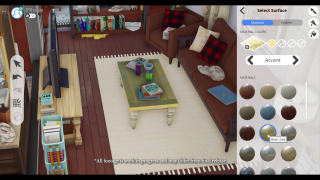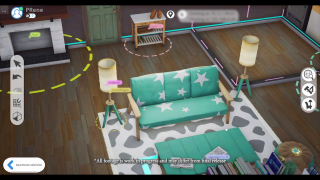Project Rene: playtest sulla nuova generazione di The Sims
Scopri come il team di Maxis dietro il nuovo titolo di The Sims coinvolge i fan nel processo di sviluppo

Per Maxis la community è essenziale. Anno dopo anno, i fan di The Sims™ continuano a stupirci con la loro creatività, la loro perspicacia e la loro passione per i nostri giochi. Così, mentre iniziavamo a pensare a quale forma dare al nuovo titolo di The Sims, non avevamo dubbi che la community avrebbe dovuto far parte del processo di sviluppo.
"Sapevamo fin dall'inizio che qualsiasi direzione avrebbe preso The Sims sarebbe stato un viaggio con i nostri giocatori", afferma Lyndsay Pearson, vicepresidente della sezione creativa di The Sims. "Che si tratti di produrre idee, reagire ai loro feedback o di mettere nelle loro mani un vero e proprio software, è importante trovare modi per condividere i nostri obiettivi e la nostra visione passo passo."
"Il feedback diretto dei giocatori è stato uno degli strumenti più preziosi che abbiamo usato qui a Maxis", aggiunge Stephanie Callegari, responsabile di produzione. "Non c'è dubbio: dobbiamo trasformare quest'esperienza sia per i giocatori che per il team di sviluppo."

TEST IN CONTINUA EVOLUZIONE
Di conseguenza, fin dagli esordi del Project Rene, il nuovo titolo di The Sims, il team ha deciso di iniziare a raccogliere i suggerimenti della community.
"Nell'autunno del 2022 abbiamo pubblicato un piccolo playtest privato che ha valutato design d'interni, personalizzazione degli arredi e design collaborativo per dispositivi mobile e PC", afferma il game director Grant Rodiek. "Lo si può vedere in un video del nostro primo episodio di Behind The Sims."
Il test "Personalizzazione degli appartamenti" includeva solo una piccola parte di ciò che era in programma per l'intero progetto, ma si trattava di una sezione scelta specificamente per testare un'enorme varietà di sistemi diversi per vedere come interagivano tra loro.
"Uno degli aspetti più impegnativi del testing di The Sims", afferma Grant, "è che si tratta di un'esperienza altamente personalizzabile con un elevato grado di interattività. I Sims devono potersi sedere sul divano, preparare pasti, andare a ballare, chiacchierare con un amico o leggere un libro, il che significa che, quando si personalizza un divano o una camicia, ciò condiziona anche il modo in cui i Sims si muovono e considerano i propri ambienti. Questo ci permette di testare un'ampia varietà di esperienze e tecnologie cruciali per il progetto in generale."
"E l'ambiente fisico e lo spazio degli oggetti sono strumenti essenziali per raccontare storie", dice Stephanie. "Quindi le innovazioni fondamentali che abbiamo testato aiutano a prendere decisioni riguardo ad altri spazi creativi, come il sistema di creazione dei personaggi. Avremo anche testato una parte minima del gioco, ma questo ci ha permesso di riesaminare l'interfaccia e gli strumenti creativi nell'ottica di un'esperienza utente più olistica."

APETTATEVI L'INASPETTATO
Naturalmente, organizzare un playtest nelle fasi iniziali dello sviluppo presentava delle sfide uniche. "Organizziamo regolarmente test dell'esperienza utente con piccoli gruppi di 8-10 giocatori", dice Lyndsay, "ma creare un playtest più grande per centinaia o migliaia di giocatori è stata un'esperienza molto diversa."
"Project Rene supporta sia l'esperienza su dispositivi mobile che quella su PC", afferma Grant, "il che aumenta drasticamente la complessità dei test. Dobbiamo supportare un'ampia varietà di esperienze: simulazione, socializzazione, strumenti creativi per l'arredamento e il design di interni, strumenti creativi per abiti e personaggi, oltre a nuove esperienze social."
"Abbiamo anche dovuto trovare modi per consentire ai giocatori di connettersi senza avere ancora tutte le funzionalità dell'esperienza social, come la chat vocale di gruppo e la ricerca di amici", dice Stephanie. "Dovevamo fare in modo che i giocatori potessero trovarsi e giocare insieme. Inoltre, abbiamo dovuto escogitare un modo per recapitare il gioco ai tester!"
Una volta risolte le questioni logistiche, è venuto il momento di dare il via al test. Ma per quanto il team fosse ansioso di testare meccaniche specifiche, sapeva anche che in un test su piccola scala come questo è importante seguire l'input dei giocatori.
"Abbiamo sempre avuto un rapporto di collaborazione con i nostri fan, e si vede in ogni playtest", dice Lyndsay. "Quindi eravamo pronti a ricevere un sacco di feedback, di iterazioni e di speculazioni su funzionalità inedite. Credo che prepararci in anticipo ci abbia consentito di adottare un atteggiamento mentale aperto e disponibile al dialogo.
"Bisogna ascoltare ciò che i giocatori hanno da dire", afferma Grant. "Per esempio, una versione precedente del test aveva rivelato che i giocatori faticavano a trovare determinati strumenti: non riuscivano a dare i comandi. Quindi abbiamo riconfigurato il layout, fornito maggiori informazioni e notato un incredibile aumento di interazioni. È un processo di continuo adattamento."

QUESTO È SOLO L'INIZIO
E il team ha intenzione di continuare questo processo con altri playtest della community. È chiaro che Project Rene è ancora nelle primissime fasi di sviluppo, ma anche in questa fase iniziale le lezioni apprese si sono rivelate estremamente preziose.
"È così che si realizzano i giochi migliori", afferma Grant, "lavorando fianco a fianco con i giocatori. È uno strumento inestimabile, che ci aiuterà a rendere Project Rene davvero speciale. Ma... è un processo lungo e complesso."
"La personalizzazione degli appartamenti è stato il nostro primo test, ma non sarà l'ultimo", concorda Stephanie. "Abbiamo già imparato tantissimo. Essere in grado di parlare con i giocatori e ricevere feedback così in anticipo sui tempi è spaventoso, ma è anche molto emozionante."
"Si può imparare moltissimo prima di lanciare il progetto sul mercato!", dice Lyndsay. "Non solo riceviamo feedback in tempo reale dai nostri giocatori, ma abbiamo anche la possibilità di raccontare come creiamo queste esperienze, sia al nostro pubblico di oggi che a quello di domani. "
"Però c'è ancora molto lavoro da fare per Project Rene", dice Grant. "Non abbiamo ancora condiviso le nostre esperienze di simulazione e la personalizzazione di personaggi e abiti, per non parlare delle novità sulla personalizzazione degli appartamenti e altre esperienze di gioco social. Tutto questo verrà lentamente messo in piedi, condiviso, testato, ottimizzato, migliorato, condensato. E abbiamo intenzione di svilupparlo fianco a fianco con i nostri giocatori".
Per uno sguardo più approfondito al lavoro del team di Maxis su Project Rene, guarda il secondo episodio di Behind The Sims.
Se vuoi contribuire al futuro di The Sims, visita la pagina delle carriere di Maxis. Con opportunità lavorative in remoto e in ufficio in tutto il mondo, ci sono buone probabilità che la nostra community abbia un ruolo per te.

